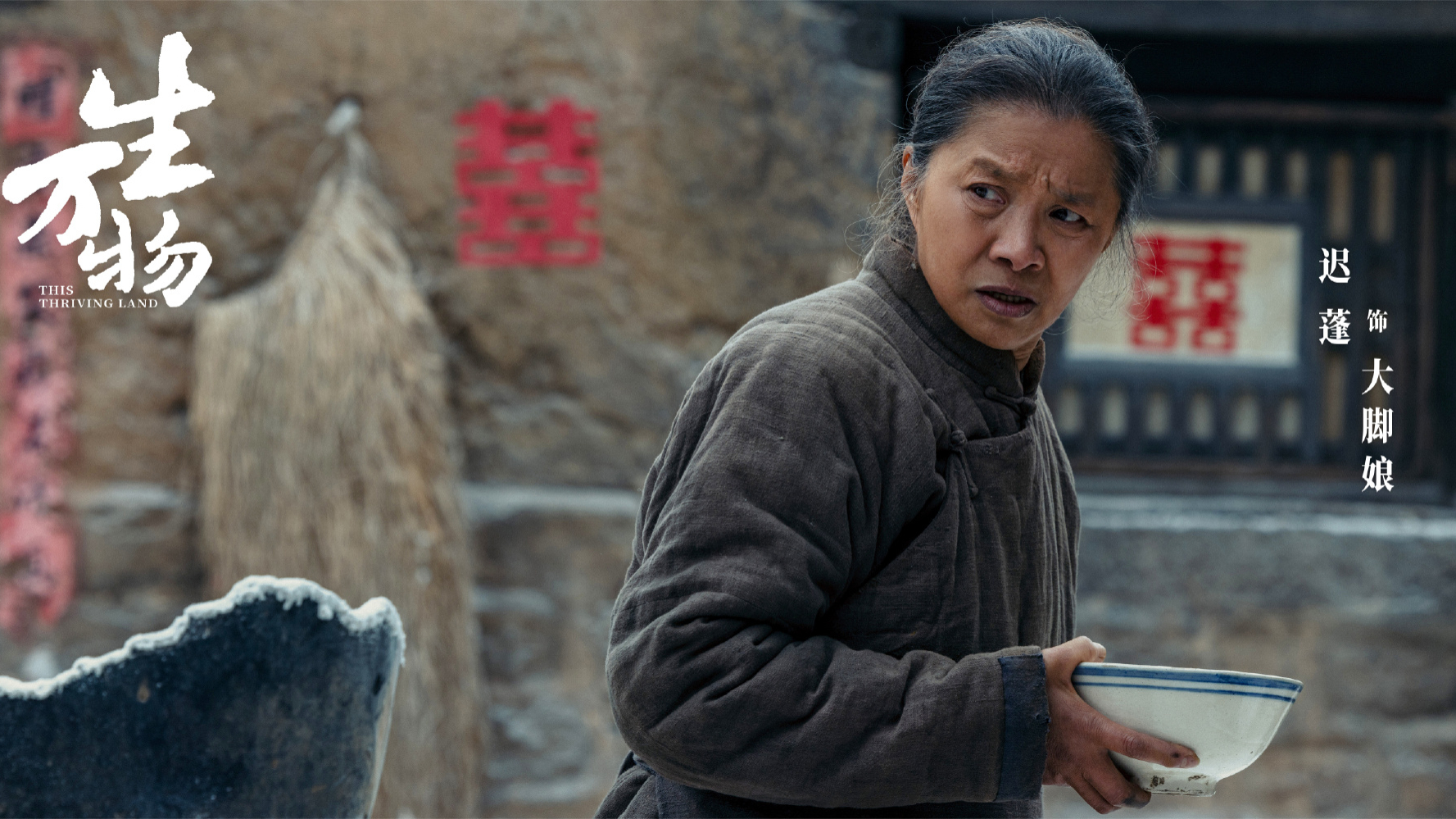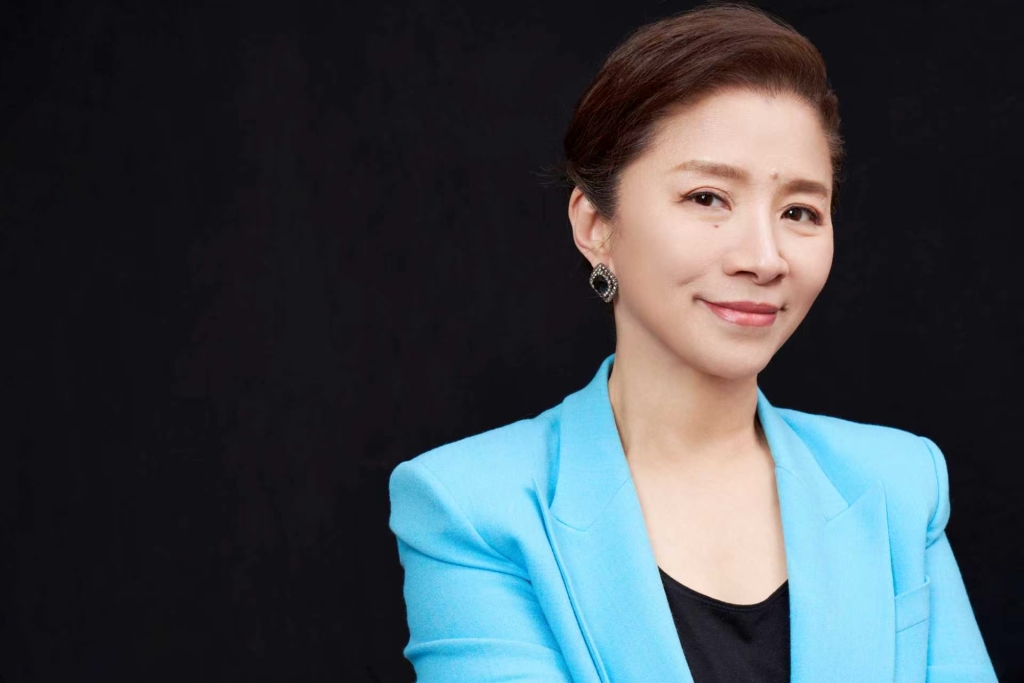
From the hateful Grandma Zhuang in "People in the Alley", to the big-footed mother-in-law who wholeheartedly protects Xiu Xiu in "Give Birth to All Things", Chi Peng has interpreted two contrasting images of mother-in-law in just one year, making the audience exclaim that during next year's awards season, "I want to give Teacher Chi the Best Supporting Actress award."
Some viewers may not know that this "professional mother-in-law" who has been frequently in the spotlight in recent years won the Feitian Award for Best Supporting Actress as early as 1983 for her role as the unemployed young woman Wu Yue in the domestic drama "Red Leaves, On the Other Side of the Mountain".
Recently, a reporter from The Paper interviewed actress Chi Peng and listened to her talk about the story behind the filming of the hit drama "Give Birth to All Things".

Talking about the opportunity to take on "Growing All Things", Chi Peng said frankly that she was immediately attracted when she heard that the play was directed by Liu Jiacheng, "because I really like his dramas, and I finally get to work with him. I agreed before I even read the script."
Chi Peng has previously challenged herself to play many different types of rural women, but what attracted her most to Big Foot Lady was her "original simplicity." "When I received this role, I knew very well that she needed a sense of the times. She absolutely couldn't be portrayed as a modern farmer. The state of modern farmers is completely different from that of farmers in the past. Her every move, every footstep, every word, and every expression in her eyes should reflect that era. My effort wasn't entirely focused on the acting, but on the character's sense of the times."
Talking about his preparations for filming "Giving Birth to All Things," Chi Peng said, "Because I've filmed similar dramas before, I have some experience and I've done my homework. Now I look at some old photos and go to bookstores to look at old film reels of people from the past. From those black and white photos, I try to find the state of the characters of that era."

Actor Chi Peng
Big Foot Lady will definitely speak out when she sees something unfair.
As everyone's "dream mother-in-law," Da Jiao Niang is someone who always stands by Xiu Xiu and supports her. Discussing the origins of this mother-in-law and daughter-in-law relationship, Chi Peng said, "Back in an era when physical contact between men and women was forbidden, Da Jiao Niang initially resisted the idea. But then her son, Da Jiao, said to her, 'I like her,' which in Shandong means 'I love her.' As soon as she heard her son say he loved this woman, her attitude took a 180-degree turn. Without a word, she accepted everything, her heart melting."
Chi Peng said that in addition to her love and recognition for her son, "deep down in her heart, she also felt very sympathetic towards Xiuxiu. After being kidnapped by a prostitute, and with neither her in-laws nor her own family wanting her, she felt she had nowhere else to go. It was a great thing that she could come to my house." Coupled with her son's outspoken love, Chi Peng changed her mind as a mother-in-law. "My son loves her, so I love her too."
Especially after Xiu Xiu's miscarriage, when Big Foot Mother came to comfort her, with just a few words, many viewers empathized and cried. Chi Peng frankly said that this kind of heartfelt emotional expression was because Big Foot Mother was a kind person from the heart, and it was her instinctive reaction.
Before Xiuxiu came into the family, the Feng family of three lived a rather dull life. "Suddenly, a woman of the same sex arrived, bringing with her so many things we had never heard of or seen before. Big Foot Mother was delighted." Meanwhile, Chi Peng believes that for Big Foot Mother, Xiuxiu's arrival gave her another companion and someone to chat with. "Xiuxiu is also sensible. Coming from a wealthy family, she's not spoiled at all. I was very touched and learned so much from her that I had never heard of before. Her arrival stirred up waves in our stagnant world."
Many netizens commented, "I hope the daily lives of the four members of the Feng family can be shown for a hundred episodes," especially the hilarious banter between Feng Er and Da Jiao Niang. Chi Peng responded, "She's being aggressive with them for the sake of the family. She wants to unite the family and make it a better life for everyone." Because of this, when Feng Er and Xiu Xiu clash, Da Jiao Niang, the mediator between the family, plays a crucial role. "She'll appear to make amends."
"My husband sometimes gets really angry with me, and I can't say anything," Xiuxiu arrives. "I even feel a little supportive. If anyone treats her badly, or makes things unhappy at home, I get anxious and rush to her defense. She's always got to speak up when she sees something unfair. If she doesn't protect her, who will?" Big Foot Mother hopes for a happy family life without conflict or disagreement. "That's the good life she wants. Having enough to eat is her greatest happiness. This old lady is kind, tolerant, and generous, with a heart full of love. That's why they live the way they do in the play."
We are like a family, all trying hard to think about the play
Speaking of his co-stars, including Yang Mi (Xiu Xiu), Ou Hao (Big Foot), and Lin Yongjian (Feng Er), Chi Peng expressed how pleasant it was to work with them. "They're all incredibly hardworking and dedicated. This crew is one of my favorites I've ever worked with. Not only is everyone so harmonious, like a family, but everyone is also incredibly focused, intensely focused on finding the character's voice, thinking through the scenes, and refining their own characters. I particularly enjoyed the entire creative process of this group, including the landlord's family and Qin Hailu's family."
When asked by reporters whether there were any impromptu scenes in the play's many everyday dialogues, Chi Peng stated that the script was meticulously polished, and while most of the lines were written, there were also some specific lines that were improvised by everyone. "For example," Feng Er said, "the matchmaker said you're three years older than me, and a woman three years older brings gold bricks." "Wow, I later found out you're nine years older than me." That was Feng Er's own fabrication, and I followed up with, "What's going on? Where are the three piles of bricks?"

Screenshot of "Growing Everything"
Such details were not uncommon on the set of "Growing All Things." It was this repetitive "polishing" that made "Growing All Things" a masterpiece in everyone's eyes. Chi Peng frankly said, "For example, after rehearsing the lines for the four members of the Feng family, we would discuss which parts needed more effort and design. After rehearsing the lines for each scene, everyone worked hard."
This harmonious and progressive creative atmosphere is inseparable from the encouragement of director Liu Jiacheng. Previously, when a reporter from The Paper interviewed director Liu Jiacheng , he specifically praised Chi Peng's acting style and encouraged her to stick to her own performance rhythm and not change.
Chi Peng recalled that at first, when Director Liu called her in for a heart-to-heart talk, she was very nervous. "I wondered if there was something wrong, or if I could adjust the direction, or if the character design wasn't perfect or enough. I kept mumbling and took small steps to get through it."
"I didn't expect the director to say very kindly, Chi Peng, your feeling for this character is right. I went home and edited the film and watched it together. Your own rhythm is different from theirs. What you are grasping now is right. Don't forget it. Just stick to your current feelings and move forward. At that time, I felt very at ease. I knew what the director wanted, and I knew that what I gave the director was right. So when I was acting with them, I couldn't forget the state of this character." Chi Peng said.
Chi Peng said that when she's figuring out a role, she likes to "take the character's pulse" first. "Sometimes, when you first get a role and haven't fully connected with it, you don't know how to follow the character. How can I catch up with her, how can I embrace her? So I take the character's pulse, try this and that, and it's a form of exploration. Then, when the director explained it to me, I felt relieved and happy, and I knew the direction to move forward."
After filming every day, she would review and analyze the content of the filming, "checking the scenes I have filmed, how I handled it, and what I am like. Not only reviewing the scenes filmed that day, but also reviewing the direction of the character since the start of filming, and whether the things you designed yourself are correct. Which ones went astray, and which ones you feel are very correct, and are the things for this character." In her opinion, only by constantly checking and examining herself can she know how to do it in the future.
During the filming of "Giving Birth to All Things," Chi Pengxi said he had "absolutely blasted it," even if it was just a passing scene. "When you find the character's sense of self, whatever you do is perfect. If you can't find it, she won't be like that no matter what. Once you capture her, you've captured the character, you hold her close, you embrace her. Her days are like yours, and your days are like hers. No matter how you film it, it's perfect."

Stills from "Giving Birth to All Things"
“Don’t be too reasonable at home”
In a series as period-defying as "Growing All Things," how can the character of Big Foot Niang be interpreted in a way that appeals to contemporary audiences and resonates with them? Chi Peng believes, "In today's world, as a mother-in-law, as a mother, and as a daughter-in-law, you must be tolerant. When you are tolerant, your life will be easier. If you constantly find fault with others, always think they are wrong, don't consider others, and are intolerant, you will turn good times into bad times."
She also took the initiative to call out to the audience, "In life, don't be too serious, don't be too pretentious, and don't be too reasoned at home. As long as it's not a matter of principle, the past is the past, and everyone is fine. Why waste the daily sunshine and air by arguing and arguing at home? You can win a championship at home, but after the argument, what's the point? Be more tolerant, so there will be fewer conflicts. Don't take it to heart. Be naive, like Big Foot Mother, and anything is fine."
This kind of calm and friendly attitude is also reflected in the character of Big Foot Mother, which is one of the reasons why everyone likes her.
Having played contrasting female characters in numerous critically acclaimed dramas, including "Happiness to Ten Thousand Homes," "People in the Alleys," and "Giving Birth to All Things," Chi Peng says the key is to grasp the character's context. For example, the character of Big Foot Mother-in-Law: "Her contrast comes from the era. In that era, she knew nothing, a subconscious expression. Later interpretations of mothers-in-law are all contemporary, with computers and everything else, and everyone is more mature and materialistic. Therefore, they will fight for their own interests, for their own territory and their own position. They all work for the good of their families, but different people, with different personalities, do things and treat people very differently."
In "Happiness to Ten Thousand Homes," she plays Lin Guizhi, who initially behaves with a certain timidity. "She would tell Xingfu, 'Don't take it personally. Your sister got a little bullied, so you blame me, your boss. This is a life-threatening situation for our family.'" But later, as she interacted more with Xingfu, she realized, "People shouldn't be submissive. They should be bold in speaking and acting, in loving and hating, and in holding their heads high, rather than being humble and content just to survive.' She followed Xingfu all the way and realized, 'My back should be straight. After all this fuss, I was living under the table.' That's why she particularly admires Xingfu."

Stills from "Happiness to Ten Thousand Homes"
Switching gears to "People in the Alley," Chi Peng believes that "Grandma Zhuang is a very typical Chinese parent." "She wants to educate and change others, and that's basically how parents of that era were. Young people are disgusted by her now, but I'm actually quite happy. If people didn't hate her, the character might not have worked." Chi Peng analyzes, "Parents in the past weren't very protective of each child's interests and character. They wouldn't protect anything. They believed in equality: if your family was doing well, you had to share. If others weren't doing well, she wouldn't say anything, but just told them to work harder. This is a rather traditional way of thinking."

Stills from "People in the Alley"
“The happiness brought by work is greater than winning awards”
Earlier, Ni Ping published an article on Weibo about her friendship with Chi Peng, and once again talked about how Chi Peng was not nominated for the Golden Rooster Award for Best Supporting Actress. This also made Chi Peng once again become a trending topic on Weibo after the conclusion of "The Creation of All Things".
As a high-quality ensemble drama with a full cast and a hit both on TV and the internet, "Giving Birth to All Things" recently held a celebration banquet, with all four members of the Feng family reunited. When asked about his outlook on next year's awards season, Chi Peng said, "If this drama wins an award next year, that would be fantastic. It would be a reward for the frantic work we put in, despite the 40°C weather and wearing cotton-padded jackets, and it would be an encouragement to everyone."

The four members of the Feng family reunited at the celebration party for "Give Birth to All Things"
When discussing her personal awards, Chi Peng said modestly, "Winning an award would be an encouragement to me and I'd be very grateful. It doesn't matter if I don't. The most important thing is that I've learned something from this play. I'm so happy to have won an award, and I look forward to it. But there are so many good actors out there, and it might not be my turn." She admitted, "The happiness brought by work is greater than winning an award."
Chi Peng said, "The greatest happiness in filming 'Growing All Things' was playing a person who was different from myself. Actors love to shape characters. There is still a distance between me and Big Foot Mother. I was able to complete her and everyone liked her, so I am very satisfied."
She also generously praised the entire crew, saying, "A large part of everyone's love for the show is, first, the screenwriter brought this character to life. She was rather bland in the original novel, but after the screenwriter's revisions, this old lady was remarkably vivid. Also, the director gave me some things, and my co-stars gave each other things, too. I feel quite privileged and honored. Of course, some of it was also due to my own efforts, but I can't rule out the fact that the character itself was already halfway done."
In her opinion, the crew of "Life of All Things" gave her a stable sense of security. "You can devote yourself to the role. On the set, you have a sense of security that comes from finding the character's self-feeling. If I can't find this feeling for the character, I will feel uneasy and anxious."
Talking about the current criteria for accepting roles, Chi Peng said that it depends on whether he likes the script and the role. "If there are characters I like, I will take them. If some scripts are just average and there are no distinctive characters, I will not take them."
As for the type of role she wants to challenge, Chi Peng hopes to step out of her comfort zone and try a more "intellectual female image", just like her previous guest appearance as Ge Jianhao in "Awakening Age".

Screenshot of Awakening Age
Chi Peng enjoys the joy of creating sparks with an excellent team. "Actors all like to work with good directors. It's worth the trip, you can learn a lot, it's very happy, and you can have a lot of fun there. It's really exciting. Of course, it's happier if you have more scenes, because it can prolong this happiness. If the role is small, I'm willing to go. Zhang Yongxin of "Awakening Age" is a director I like very much. I admire him, just like director Liu Jiacheng of "Growing All Things". I admire them all. If there is a director I like and a director I can learn from, I will definitely go, without hesitation."


